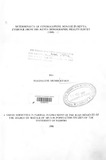| dc.contributor.author | Kyalo, Magdalene M | |
| dc.date.accessioned | 2013-05-07T15:15:47Z | |
| dc.date.available | 2013-05-07T15:15:47Z | |
| dc.date.issued | 1996 | |
| dc.identifier.uri | http://erepository.uonbi.ac.ke:8080/xmlui/handle/123456789/19955 | |
| dc.description | Master of Arts in Population Studies | en |
| dc.description.abstract | This study examines the determinants of contraceptive non-use in Kenya. The study had three
objectives. The first was to examine demographic variables associated with contraceptive non-use.
The second was to examine the socio-economic variables related to contraceptive non-use. The final
objective was to make recommendations on how to improve on the use level in Kenya.
The data used in the study was obtained from the Kenya Demographic Health Survey (KDHS)
which was carried out in 1989. Cross tabulations were utilized to assess the association between non use
on one hand and socio-economic and demographic variables on the other while the logistic
regression was used to obtain the factors which influence non-use of contraceptives.
The findings of the study revealed that there was a strong relationship between contraceptive
non-use and the category of women who reported that they were living in the rural areas. those that
were widowed, women who were living together with male partners and those who had lost two
children through death.
For those women who were reported to be having between one and three children together
with those who reported to be divorced at the time of the interview an inverse relationship between
them and contraceptive non-use was found. Similar findings were observed for those women who
at the time of the interview used transport to get to the source of contraceptives anel those that hael
secondary and higher education. This therefore shows that an increase in the numbers of women in
these categories will leael to a decrease in the number of contraceptive non users.
The logistic regression results showed no signiflcant relationship between age of the woman,
travel time to source of contraceptives and contraceptive non use.
From the findings, it was concluded that socio-economic factors are more influential in
determining contraceptive non-use when compared to the demographic factors. The most important
recommendation of the study is that education emphasizing the advantages of use of modern
contraceptives be given to all irrespective of their gender status. | en |
| dc.language.iso | en | en |
| dc.title | Determinants of contraceptive non-use in Kenya: evidence from the Kenya demographic health survey | en |
| dc.type | Thesis | en |
| local.publisher | Department of Population Studies | en |

